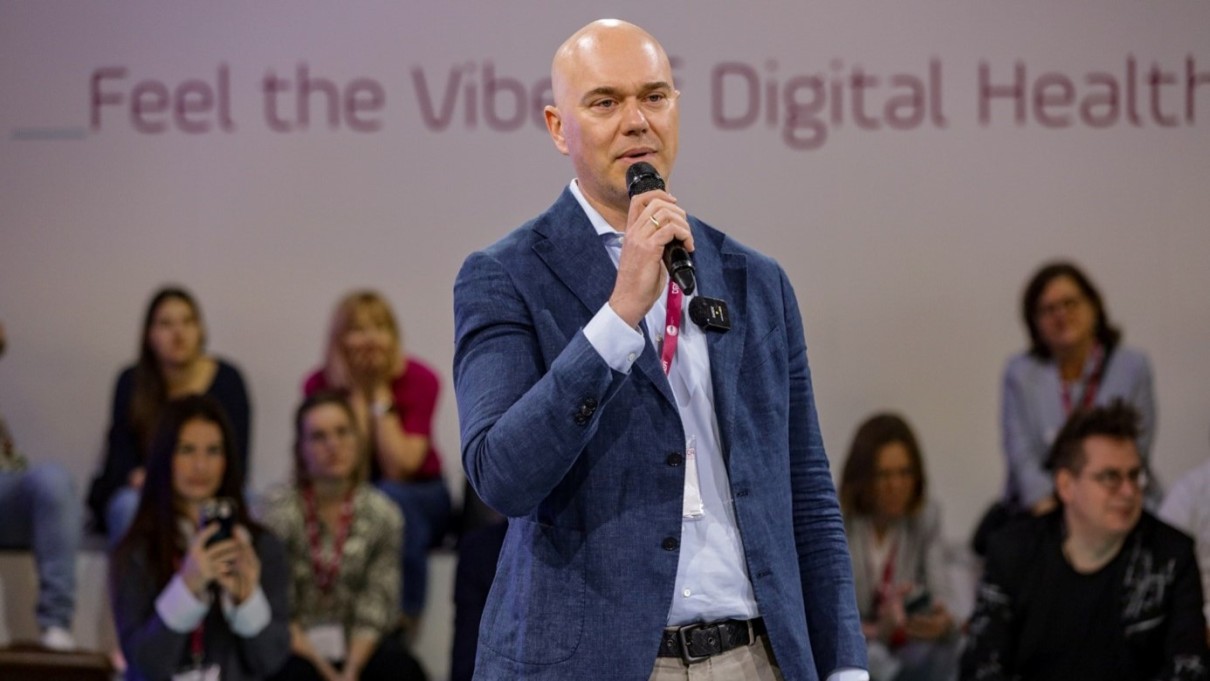Page content
Interview with DMEA nova Award winner Exploris Health

Manuel Römer, member of the management board of the start-up Exploris Health and winner of the first DMEA nova Award. Image: Messe Berlin
The search was on for nothing less than the most innovative idea from a digital health start-up - more than 90 young companies applied for the DMEA nova Award and competed against each other in several pitch rounds. In the end, Manuel Römer from ‘Exploris Health’ particularly impressed the expert jury with his idea and secured the first DMEA nova Award.
Exploris Health was founded in 2018 in the canton of Zurich. The start-up uses artificial intelligence to find dependencies in multi-omics and answer questions about complex diseases. The AI therefore combines various components on a patient-specific physiological level, as well as lifestyle habits and vital parameters. The algorithms help to make personalised diagnoses and provide treatment recommendations, says Manuel: ‘They therefore make a significant contribution to improving individual patient care, while at the same time reducing costs for the healthcare system.’
The body is a source of data
It sounds very technical, but is based on a natural approach - everything in the body is connected. ‘However, medicine has long focussed on measuring and evaluating individual values.’ The Exploris team, together with Prof. Michael Zellweger from the University Hospital Basel, therefore asked themselves whether there was a combination of standard parameters that could provide personalised and gender-specific answers to disease stages. To get to the bottom of this question, they focussed on coronary heart disease. The disease often progresses silently for years and is only recognised when it is often already too late - with a heart attack.
From pitch to award
Such innovative solutions were sought for the DMEA nova Award. The start-ups were able to apply for one of four categories: sustainable company organisation; focus: patients, relatives and employees; process innovation: new forms of care, and the use of AI to improve care. Exploris Health was most convincing in the last category: ‘It was a great experience to compete with so many other strong start-ups. The relatively short time available for the pitch challenged us to work out the essence of our story,’ says Manuel.
The prize money of 2,500 euros will be used to cover the start-up's running costs. In addition to the prize money, the DMEA nova Award also attracts a lot of attention - immediately after the award ceremony, Exploris Health was accepted into the 5-HT Chemistry & Digital Health in Mannheim. This is one of 12 digital ecosystems of the Digital Hub Initiative (de:hub), which was launched by the Federal Ministry for Economic Affairs and Climate Protection. The media also focussed much more on the start-up than was the case beforehand, and Manuel and his team were also able to hold several collaboration talks with well-known companies after the final pitch. ‘All in all, a great success and an outstanding opportunity,’ he emphasises.
Starting signal for the second DMEA nova Award
After the great interest this year, there will be another DMEA nova Award next year to find the most innovative idea or solution from a digital health startup. Startups can apply for the award from January 2025. Manuel has a few tips for interested start-ups:
• ‘Tell a story. Everyone has a large market, a motivated team and a hockey stick to offer investors. But the important thing, from my point of view, is the ‘why?’ What will be different for patients and healthcare systems when your solution is deployed in the field?
• Don't underestimate the preparation. For a 4-minute pitch, you can easily need a week to have a clear message and a common thread.
• And if you are selected by the jury, enjoy your time on stage, no matter how far you get. Being there is already a win, as there were many more applicants who didn't make it.’
Further information on the DMEA nova Award and registration from January can be found here: Startups - DMEA


